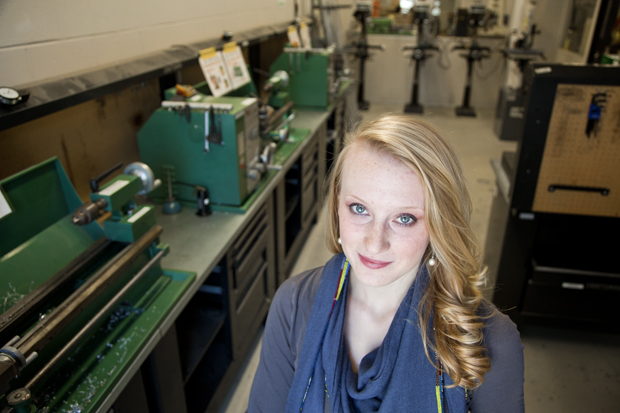‘One of the guys’: Some majors, departments divided along gender lines
November 9, 2010
When Elizabeth Parsons goes to class, she’s almost always the only female.
Parsons, a senior from Sulphur Well, is one of a handful of women majoring in mechanical engineering, and she isn’t alone in having a major that’s divided along gender lines.
There are 10 departments at WKU in which one gender makes up 80 percent or more of the students, according to the WKU Fact Book. Engineering is one of the highest, at 90.5 percent male and 9.5 percent female.
Focusing on the gender distribution among majors is important, and it’s something officials have talked about, said Richard Miller, associate vice president for Academic Affairs.
Part of the diversity plan is to target students who are interested in majors where their gender is underrepresented, such as engineering for females or nursing for males, Miller said.
“There may not be many of them, but we want to make sure those who are interested apply,” he said.
Julie Ellis, head of the engineering department, said she feels there aren’t enough students of either gender in engineering, and a lot of the recruiting the department does is aimed at getting their numbers up regardless of gender.
Still, Ellis said it’s important to address the fact that there are underrepresented minorities in engineering, including race and gender. The department has some recruiting techniques to target females, such as hosting Girls in Science Days.
“Any discipline that isn’t as diverse is going to suffer,” Ellis said. “That means that the profession is diminished.”
She said a possible reason why females might not be as interested in engineering as males is that females are often more interested in professions that will help the world, and engineering isn’t usually seen that way.
A person has to be strong academically to go into engineering no matter what gender they are, so Ellis said she thinks the women in the engineering department “seem to be holding their own just fine.”
Louisville senior Erica Rigney, a civil engineering major, said she enjoyed math in high school, yet when she told family and friends she was interested in engineering, they said she couldn’t do it.
“I wanted to prove that I could,” she said.
Rigney said it was hard at first to be surrounded by males, but “nobody can make it through that program alone, so eventually you have to talk to them.”
Once they see you’re there for the same reason as them, they give you a break, she said.
“You kinda become one of the guys,” Rigney said.
She said being in a major dominated by men has made her tough and a completely different person, yet she sees it as an advantage.
“Since there are so many boys, you stick out and can get noticed,” she said.
Parsons said she also thinks it will be easier for her to get a job in the field since she’s a minority.
That’s the main reason why Parsons switched her major to engineering, after first choosing chemistry and later business, she said.
Since she was little, she’s been taking things apart and putting them back together again, so engineering has been a good fit, she said.
“I’ve always been a huge tomboy, so it kind of makes sense that I’m in a major of mostly guys,” Parsons said. “I have always been one of the guys.”


























